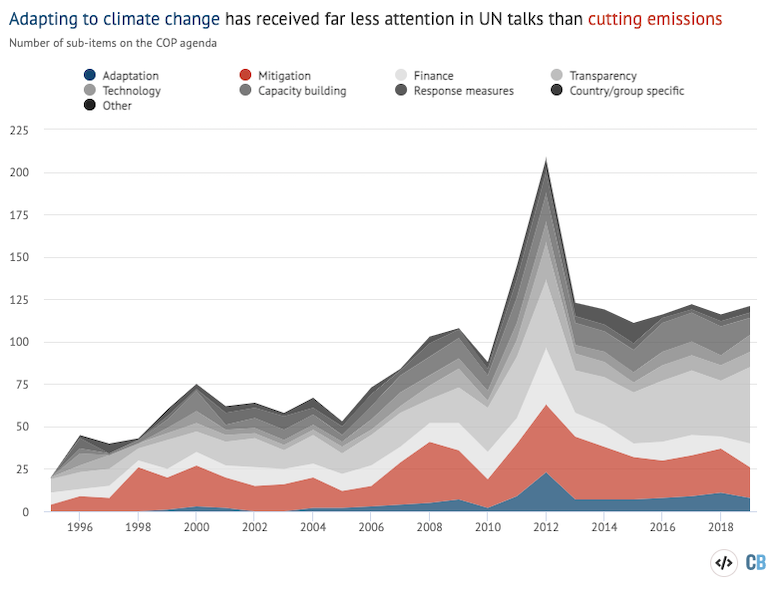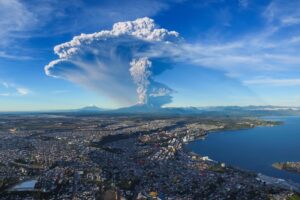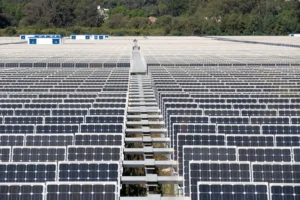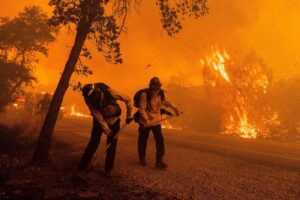
Guest post: What gets prioritised and ignored at UN climate negotiations?
Multiple Authors
10.25.22Multiple Authors
25.10.2022 | 10:14amWhen nations gather in the Egyptian resort town of Sharm el-Sheikh for another round of UN climate negotiations in November, things may get off to a rocky start.
There has been talk of an “agenda fight” at the opening of COP27 as developing countries want “loss and damage” finance added to the formal list of issues that are up for discussion. They could face resistance from developed countries.
Such disagreements have become routine in recent years and can either be smoothed over pre-COP or lead to drawn-out, public disagreements. In 2013, one arm of the process did not meet at all because most parties did not agree to Russia’s bid for a new agenda item.
It will be up to the Egyptian presidency to broker a deal on the loss-and-damage question before COP27, or the opening may signal fractured views rather than momentum for climate action.
Whatever the outcome, it is clear that agendas are worth fighting over. Once an issue is on the agenda, negotiations can go ahead with a procedural armour that protects the topic and hopefully leads to outcomes and decisions.
In our new study, published in Climate Policy, we analysed COP agendas going back to 1995 to understand which issues have been prioritised – and those that have not.
Our results identify some significant gaps in the discussions over the years, including little focus on cutting emissions from major polluting sectors such as the fossil fuel industry.
Why agendas?
Agendas can tell us how countries view the priorities of climate governance. All countries must agree to the agenda and the issues it lists.
While there have been a few rare exceptions, such as the ocean-related outcomes at recent COPs, if something is left off the agenda, it usually signals an end of the road for that issue.
Given their importance, we took a closer look at the agendas of all the UN Framework Convention on Climate Change (UNFCCC) negotiation bodies, from 1995, when the first COP was held in the German capital of Berlin, through to COP25 in Madrid in 2019.
We compiled a database using 218 agendas, tracking 502 agenda sub-items, which are the specific lists of issues to be discussed on the agendas.
We categorised all of the agendas’ sub-items by their main area of focus, considering when issues emerged on the agendas and how long they stayed.
There are limitations to this approach. One agenda item on loss and damage might generate hours of COP discussions while one item on education may only be given only a single negotiation time slot, even though both make up one sub-item. However, it still provides an insight into the evolution and balance among issues over time.
The big two: transparency and mitigation
Overall, there have been a consistent top nine substantive topics in climate negotiations and two that stand out.
The first is transparency, meaning decisions about how countries report their progress on issues such as national emissions and climate finance. The second is mitigation, which means reducing greenhouse gas emissions.
These issues appear more often historically than any others. But our results show important differences in how they have evolved and identify glaring gaps.
We found that transparency issues have tended to move more quickly from rule creation to implementation. Issues reappeared less often and were shorter lived than those related to mitigation. This indicates progress on transparency issues, while mitigation has often stalled.
In discussions on reducing emissions, we found that stalemates and prolonged discussions were far more common. These issues reappeared on the agendas over and over, especially for market-related negotiations.
Mitigation also rarely featured discussions related to reducing emissions from major polluting sectors, including the fossil fuel industry. International aviation and shipping – referred to under the topic of “bunker fuels” – have been on the agenda more than any other mitigation issues, but we could not find evidence of any substantive discussions since 2005.
Rise of ‘new’ issues
If there is a loss and damage finance agenda item at COP27, it would be part of a wider increase in the attention being paid to the effects of climate change at UN talks.
As the world has collectively failed to stabilise temperatures, there has been an increase in discussions on adapting to climate impacts and dealing with resulting loss and damage.
Discussions of gender, local communities and Indigenous groups have focused to an extent on the disproportionate impact climate change has on these people.
However, adaptation and loss and damage are relatively “new” issues that have appeared less often in UNFCCC agendas. This is despite discussions of how to address the effects of climate change dating back to the time when the Convention was signed in the early 1990s.
As the chart below shows, there have still been far fewer sub-items relating to adaptation (blue) over the years than mitigation (red).

Agendas for the future
To continue to achieve consensus on agendas, they may need to become more balanced with items beyond those that have traditionally dominated the discussions.
The calls for greater focus on loss and damage partly reflect the demand for greater parity. These are certainly issues that will require more attention as the impacts of climate change become ever more apparent.
With the attention of the UN climate process largely focused on implementing the Paris Agreement, raising new issues may be a challenge.
The Paris Agreement gives countries the flexibility to come up with their own tailored approaches to addressing climate change, in the form of nationally determined contributions (NDCs). Will future agendas still have room to address sources of emissions in a meaningful way that builds on NDCs?
It may be up to presidencies to decide whether – and how – to push for specific issues, as the UK did in Glasgow. This option is more temporary than standing negotiations, but it may be the only option left.
For an item to be formally placed on the agenda, it requires the consensus of other parties.
While the proponents of loss and damage finance want a strong outcome that is to their liking, its placement on the agenda is also important on legitimacy grounds.
It would mean that the topic is accepted as valid and legitimate for discussion in a multilateral setting. For a process that is doing its best to maintain the trust of all parties, agreeing to formally discuss loss and damage finance may be the least it can do.
Allan, J.I. and Bhandary, R. R. (2022) What’s on the agenda? UN climate change negotiation agendas since 1995, Climate Policy doi: 10.1080/14693062.2022.2120453
-
Guest post: What gets prioritised and ignored at UN climate negotiations?





